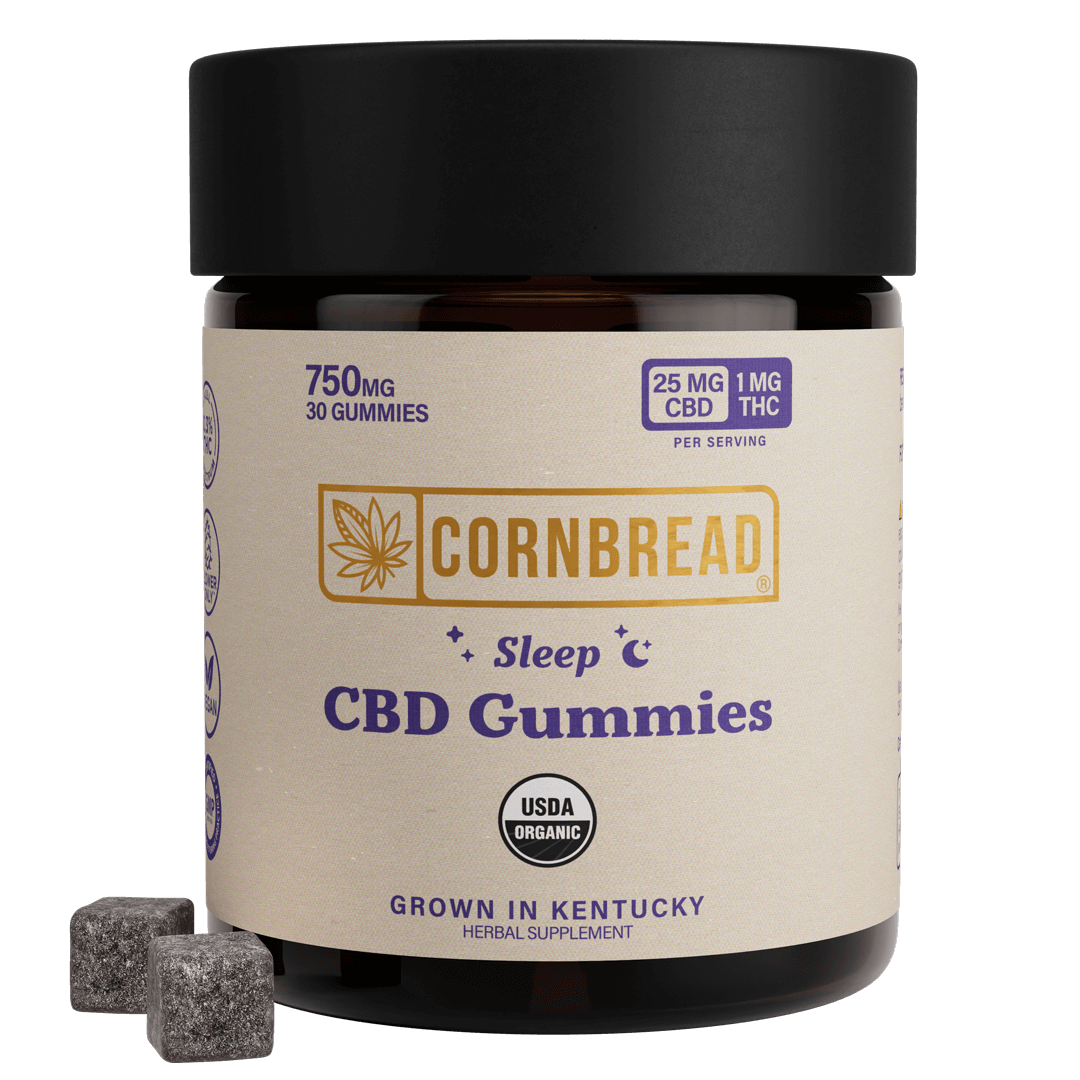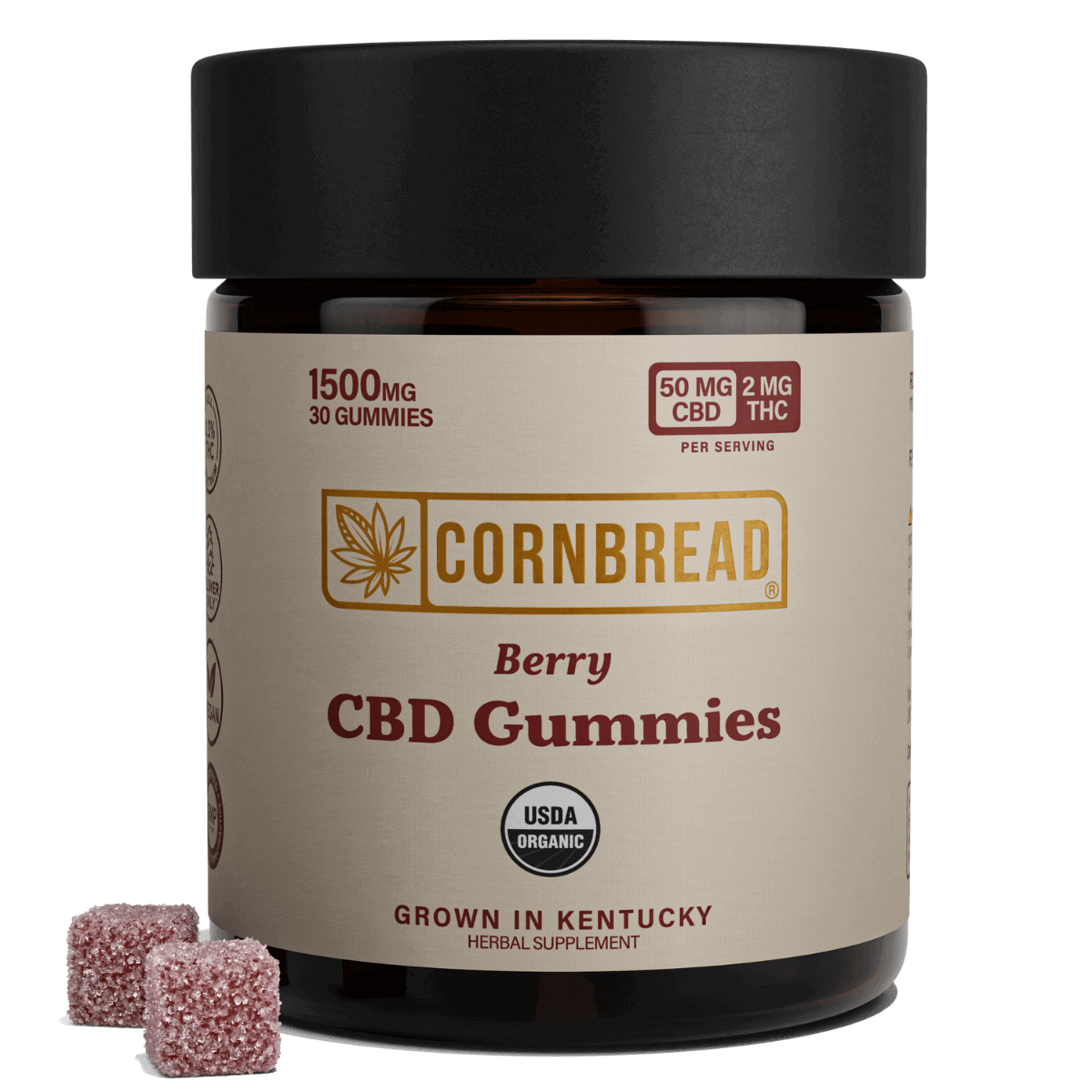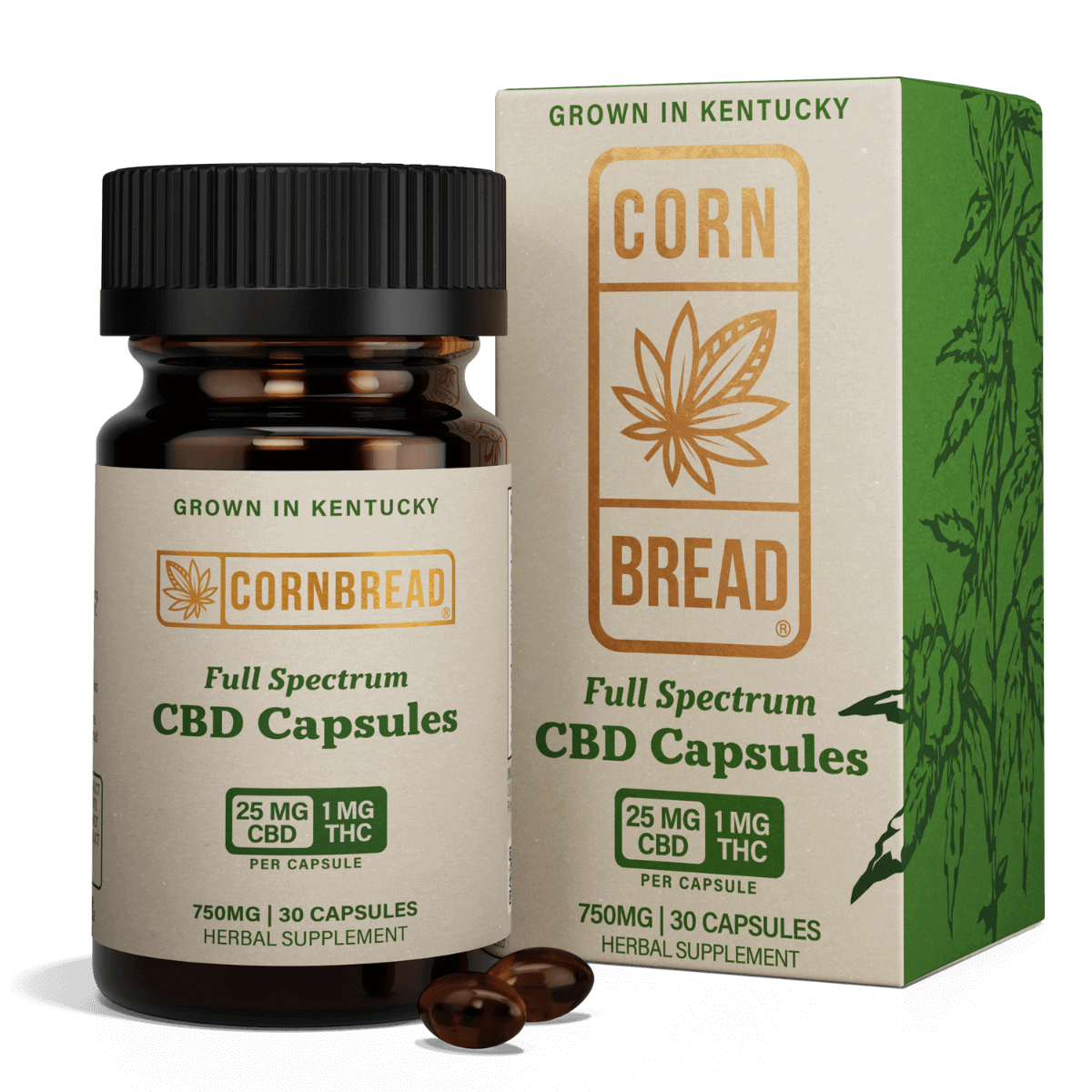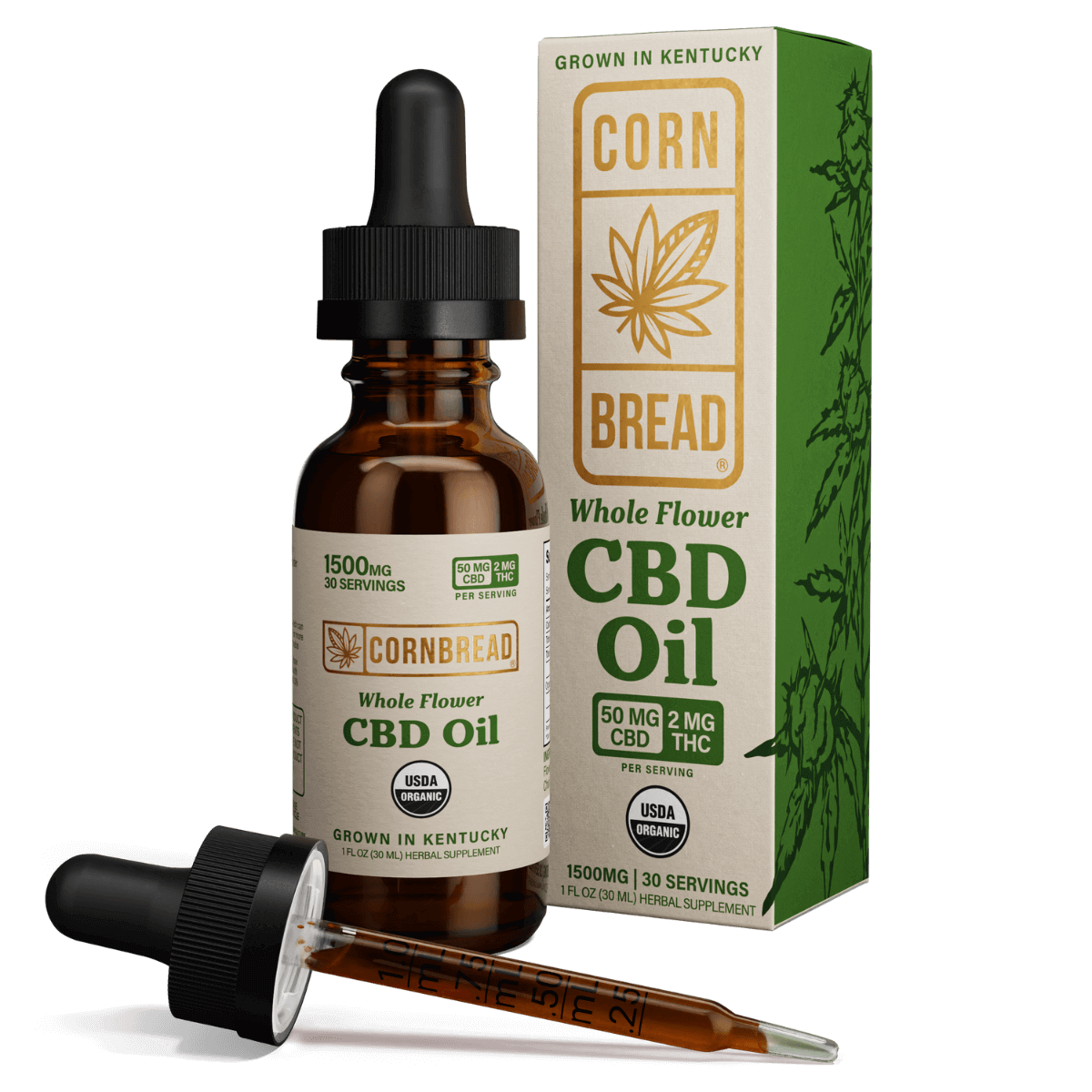Table of Contents
- Introduction
- What Is CBD?
- How Does CBD Work?
- Should You Use CBD for Tooth Pain?
- Major Causes of Tooth Pain
- Traditional Pain Treatment Options in Dentistry
- How To Find High-Quality CBD
- Three Types of CBD (in Order of Efficacy)
- CBD Oil vs. Gummies: Choosing Your Tooth Pain Ally
- Full Spectrum CBD From Cornbread Hemp
Introduction
Since the passing of the 2018 Farm Bill legalized hemp on a federal level, CBD has quickly become favored as a natural and safe solution for a variety of issues. For instance, CBD helps to support healthy sleep, reduce everyday stress, improve mood, and even relieve occasional aches and pains (like those you get after a day at the gym).
It's clear that CBD offers a variety of health benefits, but does CBD help with tooth pain? Can dental patients avoid heavy pain killers by simply popping a CBD gummy or taking a dropperful of CBD oil?
In this article, we'll examine the topic of CBD for tooth pain as well as how to choose the best cannabidiol supplement, no matter what results you’re hoping for.
What Is CBD?

You've probably heard the term "CBD" a million times by now, but you may still not know exactly what it is. Let's break it down.
-
Cannabidiol (aka CBD) is a special cannabis molecule called a cannabinoid. In addition to CBD, cannabis plants like marijuana and hemp contain 100+ unique cannabinoids. One of the most well-known cannabinoids is tetrahydrocannabinol (aka THC), which is responsible for the "high" feeling associated with marijuana.
-
Most CBD on the market is derived from hemp plants and not from marijuana. This is because hemp plants have much more CBD (and much less THC) than marijuana plants. Also, hemp is federally legal, while marijuana remains a controlled substance in the U.S.
-
American-grown hemp plants contain no more than 0.3% THC, in accordance with the 2018 Farm Bill. This means that CBD derived from hemp will also contain no more than 0.3% THC.1
Now that you know what CBD is, let's take a look at how CBD does what it does.
How Does CBD Work?
CBD interacts with a very particular system within the body — the endocannabinoid system.
This system is made up of three parts: cannabinoid receptors, enzymes, and endocannabinoids (from "endo-" meaning "within").
-
Endocannabinoids are cannabinoid-like molecules that are produced within the body. Due to their strong resemblance to plant-derived cannabinoids, which were discovered first, they were actually named after them.
-
Cannabinoid receptors are located throughout nearly every part of the body, with special concentrations in the nervous systems and the gut. Endocannabinoids bind with receptors to trigger certain reactions and help to maintain balance throughout the body's various systems.
-
ECS enzymes further help to regulate the ECS by breaking down endocannabinoids after they've performed their functions.
CBD's Special "Power"
THC and most other cannabinoids interact with the ECS by binding to cannabinoid receptors in different parts of the body. For instance, THC binds to certain receptors in the brain, thereby producing a "high" effect."
CBD, on the other hand, doesn't seem to have a strong affinity for binding with receptors. Instead, it hinders the breakdown of other cannabinoids and endocannabinoids by the ECS enzymes, allowing them to interact with receptors for an extended period of time, ultimately producing greater effects.
Basically, anything good the ECS can do, can be done even better with the help of CBD.
Should You Use CBD for Tooth Pain?

Before you reach for an addictive opioid or a potentially liver-damaging NSAID to relieve pain in your tooth, consider the following.
In a November 2023 study, researchers set out to determine whether or not CBD could be an effective alternative analgesic (pain reliever) for acute dental pain. The results of their randomized trial were promising enough to inspire consumers to explore CBD as an option for tooth pain.2
One thing that may affect how you choose to relieve tooth pain is the cause of your tooth pain. Let's review.
Major Causes of Tooth Pain
There are several reasons you may be experiencing tooth pain. Understanding the underlying reason is an important step in determining how best to relieve your pain.
-
Cavities: A cavity is a small hole or opening in the hard outer tooth layer (enamel). Cavities are most often caused by poor oral hygiene, eating lots of sugary foods, or a buildup of plaque. An untreated cavity can lead to a severe toothache, infection, or even tooth loss.
-
Gum Disease: Gingivitis is a mild form of gum disease in which the buildup of plaque and bacteria leads to an inflammation in the gums. If left untreated, it can progress to the more serious periodontitis, in which the surrounding oral tissues become inflamed as well. This can cause the gums to recede and the teeth to become loose as a result of damage to the supporting bones.
-
Dental Abscess: A dental abscess is a pocket of pus that forms in the teeth, gums, or in the bone that holds the teeth. Abscesses typically result from an infection in the mouth due to tooth decay, an impacted tooth, or severe gum disease.
-
Tooth Fracture: A tooth fracture is a crack or break in a tooth typically resulting from an impact. A tooth fracture can expose the nerve and cause severe pain.
-
Dental Trauma: Dental trauma is any injury to the teeth, gums, soft tissues of the mouth, or jawbone. The most common causes are accidents, falls, car wrecks, and sports-related injuries. Examples of dental trauma include fractures, damage to the tooth pulp (interior of tooth), and tooth displacement.
-
Tooth Sensitivity: A tooth may become hypersensitive if its roots are exposed or the enamel layer has deteriorated. Those with tooth sensitivity may experience pain when the tooth comes into contact with food or drink that is hot, cold, or sweet.
-
Impacted Wisdom Teeth: Impacted wisdom teeth are third molars in the back of the mouth that do not fully break through the gums. These can cause swelling, discomfort, and pain.
-
Teeth Grinding: Frequent grinding or clenching of teeth (typically during sleep) can result in worn down enamel, tooth sensitivity, and pain.
-
Sinus Infection (Sinusitis): Sinusitis is an inflammation of the sinuses that can cause a reflective pain in the upper rear teeth (which are near the sinuses).
Many of the issues noted above can be prevented with good oral hygiene and regular visits to the dentist. But if you're struggling with tooth pain now, then wishing you'd brushed and flossed more isn't going to make you feel better.
When it comes to good oral health and tooth pain relief, personalized care and professional guidance are key. Start by scheduling an appointment with your dentist, then consider trying some CBD to see if that helps you relax enough to get some rest in order to feel some relief.
Traditional Pain Treatment Options in Dentistry
Dentistry dates back over 9,000 years as one of the oldest medical professions in history. In those days, "tooth worms" were the imagined culprits of tooth decay.3 Of course, the science of dental care and oral hygiene have come a long way, but when it comes to how we relieve tooth pain, we're still figuring that out.
Opioids for Tooth Pain
Opioids have a long history in dentistry. What began as an extract from the poppy plant in ancient times, became a miracle painkiller (morphine) in the 1800s, and eventually the highly addictive oxys of modern day.
Opioids, such as hydrocodone and oxycodone, are often combined in formulations with acetaminophen or aspirin. They work by binding to opioid receptors, thereby blocking pain signals between the brain and the body.4
Opioids Come With Heavy Risks
As effective as opioid medications are at reducing severe tooth pain, they're also highly addictive. Misuse of one of these medications may result in an overdose or even death. And just because an opioid is prescribed by a doctor or dentist, doesn't mean it's safe. Research indicates that the risk of overdose is higher among dental patients who fill an opioid prescription, compared to those who don't.5
NSAIDS for Tooth Pain
NSAIDS are nonsteroidal anti-inflammatory drugs, such as ibuprofen, aspirin, and naproxen. NSAIDS work by inhibiting a particular enzyme which plays a key role in the inflammatory response. In simple terms, NSAIDS relieve pain, reduce temperature, and alleviate inflammation.
Believe it or not, NSAIDS have been observed to reduce pain more effectively than opioid pain relievers and are recommended by the American Dental Association as the first-choice for treatment of acute pain.6
NSAIDS Come With Their Own Risks
NSAIDS may be effective at reducing swelling, sudden pain, and inflammation, but they also interfere with bone healing (which is essential for a successful dental implant).7 NSAIDS have the potential to cause digestive issues (e.g., heartburn, ulcers), kidney injury (e.g., easy bleeding or bruising), and mild allergic reaction. For some people, taking NSAIDS could increase their risk for heart problems.
CBD: A Holistic Approach
The way in which CBD may be able to provide relief to those suffering from tooth pain is more nuanced. CBD may not be able to directly affect your dental pain perception, but there are several positive effects CBD can create which will help to alleviate the discomfort.
-
CBD has the ability to amplify the ECS in its efforts to maintain homeostasis (overall balance) throughout the body, which includes influencing the body’s immune response and pain perception.8
-
CBD is known to elevate mood, which can help bring about a more positive outlook and make dental discomfort more manageable.
-
CBD can help to relieve stress and make you feel more relaxed, which can make it easier to get rest (which is crucial for managing chronic pain).
Side Effects of CBD
CBD is generally well tolerated, and most people don't experience side effects when they take CBD as recommended. For some, CBD may cause mild side effects, such as dry mouth, reduced appetite, diarrhea, and drowsiness (though that last one may be good if you're trying to get some rest).
But you know what CBD doesn't do? It doesn't inhibit the healing process or raise your risk of heart problems. It also isn't addictive and can't cause an overdose. When compared to opioids and NSAIDS, CBD is definitely the safest option.
How To Find High-Quality CBD

If you haven't noticed yet, CBD is everywhere. From boutique wellness shops to big-chain grocery stores, practically everyone is selling this special cannabis compound. Unfortunately, not all CBD is created equal. Once you're ready to see what CBD can do for you, be sure to remember the following when choosing a supplement:
Organic Hemp Is the Best Hemp
Organic hemp is grown according to strict USDA standards, ensuring (among other things) that pesticides aren't used in the cultivation of the plant. This is especially important when it comes to hemp because it's a "bioaccumulator," which means it absorbs contaminants from the soil faster than it can release them.
You can avoid unnecessary exposure to harmful toxins and contaminants by only consuming organic CBD.
Third-Party Testing Is a Must
Some CBD companies are less than honest with their labeling and product descriptions. Look for reputable companies that use third-party lab tests to confirm the actual cannabinoid content of their CBD products and verify that no heavy metals, pesticides, or other toxins are present in their supplements.
COA (Or It Didn't Happen)
It's all well and good for a company to say it does third-party testing, but if the results aren't made available to the public, it's a moot point. Before you purchase any CBD product, take a look at its certificate of analysis (COA). This is an official document that details the results of the product's third-party lab test.
If a CBD company doesn't make their COAs available for you to review, find another company that does.
Three Types of CBD (in Order of Efficacy)
There are hundreds, if not thousands, of different CBD products on the market. But despite all the minute differences, there are really just three types of CBD out there: full spectrum, broad spectrum, and CBD isolate.
Top Choice: Full Spectrum CBD
Full spectrum CBD products don't just include CBD. They have various other cannabinoids, as well as terpenes and flavonoids, which are responsible for hemp's color, aroma, and flavor. Full spectrum CBD also contains a small amount of THC, but no more than 0.3%.
All of these cannabis compounds work together synergistically to create the "entourage effect" — whereby the potential benefits of CBD (and the other cannabinoids) are magnified.
Second Choice: Broad Spectrum CBD
Broad spectrum CBD is similar to full spectrum in that it contains a variety of cannabinoids, terpenes, and flavonoids, in addition to CBD. The big difference is that all detectable THC has been removed from broad spectrum CBD.
Third Choice: CBD Isolate
CBD isolate is just what it sounds like — isolated pure CBD. There are no other cannabinoids, no terpenes, no flavonoids, and definitely no THC.
Due to full spectrum CBD's ability to produce the entourage effect, it's considered the most effective of the three types of CBD. Whether you decide on CBD oil, salve, gummies, or some other CBD supplement, just make sure it's full spectrum for best results.
CBD Oil vs. Gummies: Choosing Your Tooth Pain Ally
Two of the most popular types of full spectrum CBD supplements are CBD oil and CBD gummies. Both offer the standard benefits of CBD, but each comes with its own pros that should be considered before you make your pick.
CBD Oil: Precision and Potency
CBD oil is a combination of hemp extract with a carrier oil (e.g., coconut oil). It tends to have an earthy flavor and is most effective when held under the tongue for 30 seconds to a minute before swallowing. Some of the pros of CBD oil include:
-
Flexible dosing: You can use the dropper cap to easily increase or decrease your dose depending on your needs.
-
Rapid absorption: A portion of the CBD is quickly absorbed through the blood vessels under the tongue for fast-acting relief.
-
No chewing needed: This pro is specific to the subject of tooth pain. If your teeth hurt, you probably don't want to chew anything. In that case, a dropper of CBD oil is perfect.
CBD Gummies: Flavorful and Convenient
On the flip side, CBD gummies are the fruity, chewy way to take cannabidiol. Gummies come in different flavors and shapes, but they're all chewy like gummies should be.
-
Convenient and easy to dose: CBD gummies are more convenient to take than CBD oil since each gummy contains a particular amount of CBD and you don't have to measure out a precise amount of liquid.
-
More flavorful than CBD oil: CBD gummies are typically fruit-flavored and have a more pleasant taste than CBD oil.
-
Inconspicuous and easy to travel with: If you plan to take your CBD dose while you’re out and about, you might be more comfortable with gummies. You can quickly pop a gummy in your mouth without drawing any unwanted attention. Not as easy when you're holding a dropperful of CBD oil under your tongue for a minute.
Full Spectrum CBD From Cornbread Hemp
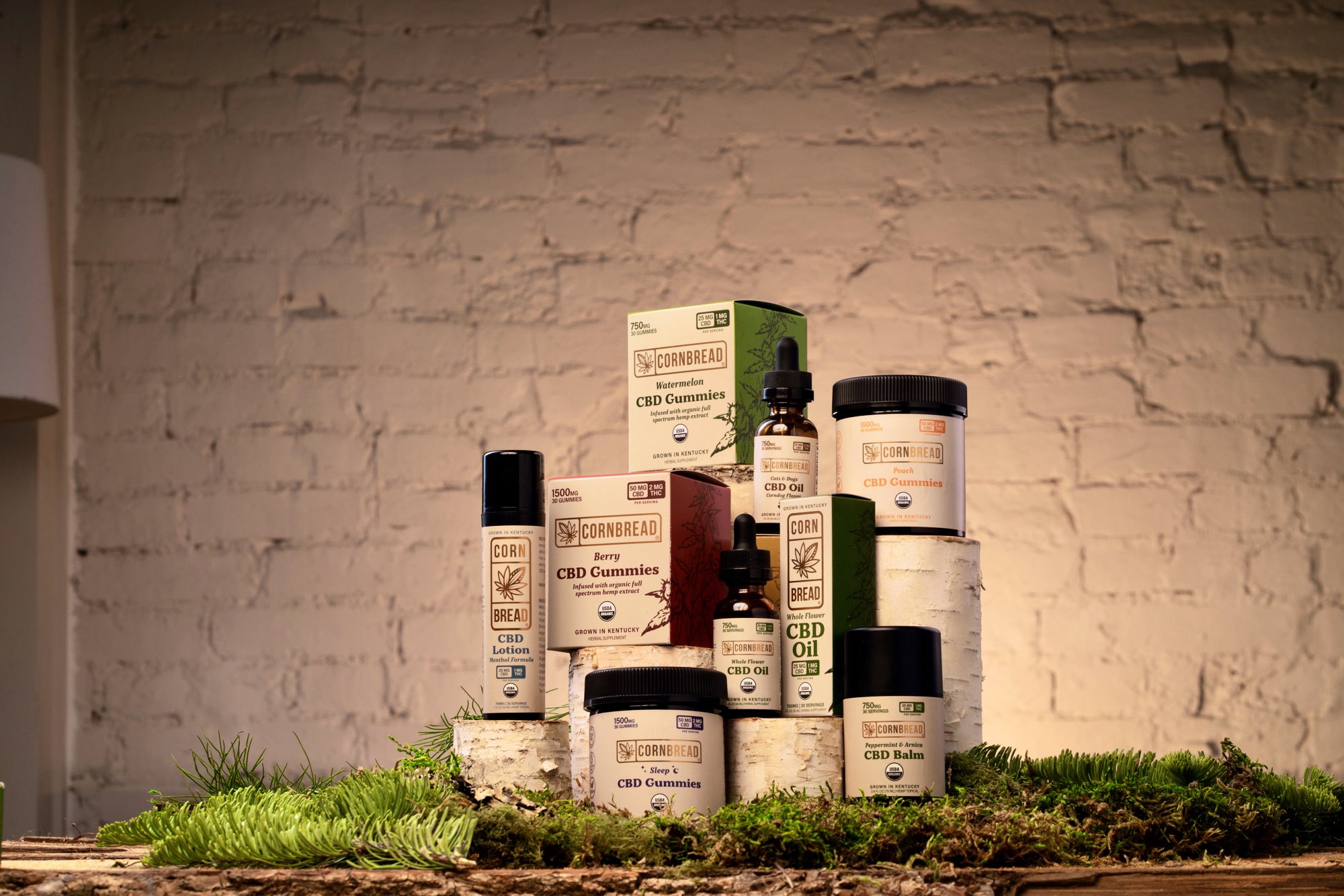
Whether you choose CBD oil or CBD gummies, Cornbread Hemp is dedicated to providing pure and potent cannabidiol supplements to ensure the greatest potential benefits. Our full spectrum CBD products are made from Flower-Only™ extract, and are USDA certified organic at every stage.
Through our rigorous third-party lab testing, and certificates of analysis made available on our website, you can trust in the quality of our hemp-derived cannabidiol products.
Shop now to discover what full spectrum CBD can do for you.










 Log in
Log in















